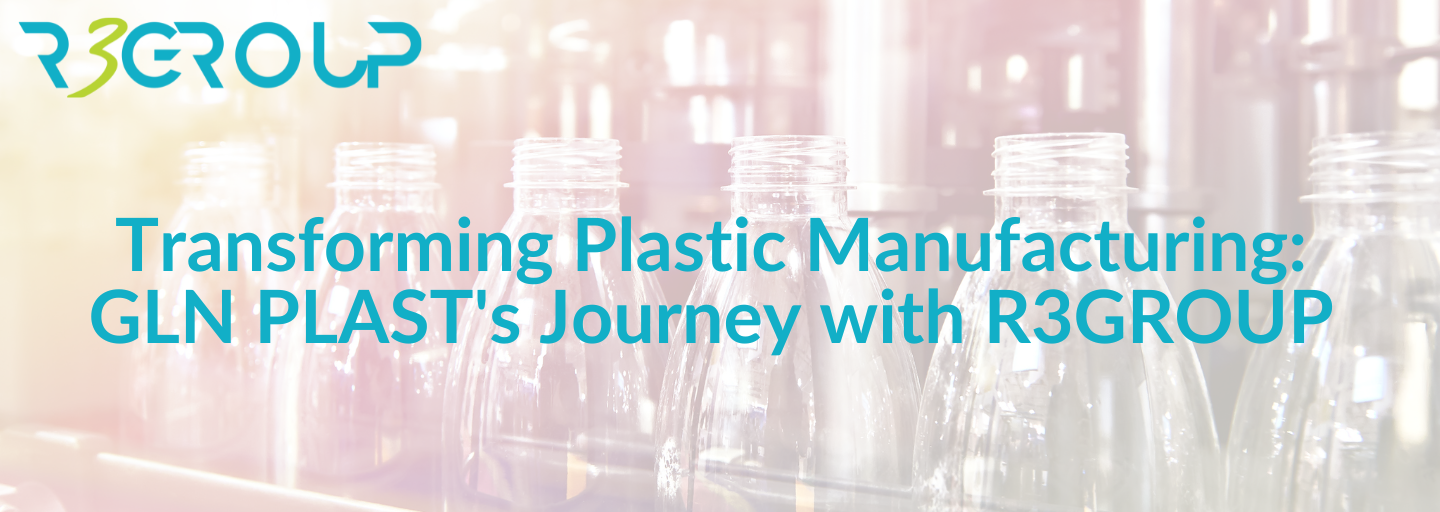GLN PLAST, a prominent player in the plastic injection molding industry, is at the forefront of innovation and efficiency in manufacturing. Founded over two decades ago, GLN PLAST has evolved from a mold manufacturing company into an international leader known for its high-quality plastic components. Today, it serves diverse markets, including automotive, consumer goods, medical devices, and food packaging. As part of the R3GROUP initiative, supported by the European Commission, GLN PLAST is embarking as a pilot in the project to enhance production efficiency and flexibility through advanced digitalization and reconfigurability solutions.
GLN PLAST is a key member of the larger GLN Group, which started with LN Moldes. Over the years, the company has integrated plastic component injection into its operations, maintaining a strong focus on new technologies. Since its inception in 2000, GLN PLAST has grown from a small local business into a globally recognized entity. It specializes in the mass production of plastic injection parts, addressing the needs of various industries with a commitment to quality and innovation.
Goals of R3GROUP pilot
The R3GROUP pilot at GLN PLAST aims to revolutionize the company’s manufacturing processes by implementing advanced automation and smart manufacturing technologies. The primary objectives include enhancing production efficiency, reducing waste, and increasing flexibility. By streamlining operations and reducing reconfiguration time, GLN PLAST expects to improve the overall quality of its plastic injection parts, respond more swiftly to market demands, and cut operational costs.
Challenges in Production Reconfiguration
GLN PLAST faces significant challenges in its production processes. Frequent changes in production configuration are required due to the diverse nature of the products manufactured. This involves not only the physical reconfiguration of the workcell, which comprises 3 to 6 modules (including injection molding machines and peripherals), but also the intricate process setups. Additionally, material shortages, particularly in high-quality plastic resins, pose risks to production schedules. Introducing new plastic materials, including recycled plastics, necessitates rigorous testing and adaptation of existing processes to ensure consistent quality and performance. Addressing these challenges is crucial for maintaining competitiveness and sustainability.
R3GROUP Solutions to Address Challenges
The R3GROUP solutions are tailored to tackle GLN PLAST’s key challenges by incorporating advanced automation, real-time monitoring, and adaptive manufacturing systems. The demonstration will integrate the ability to reconfigure the production line according to material-related disruptions, such as quick changes of material references or the integration of recycled materials.
Key components of these solutions include:
- Evolutive Mold Development: This allows for testing markets with low capital expenditure (CAPEX) and anticipating market downscaling.
- Evolutive Quality Assurance (QA) Solution: This reduces reconfiguration time and cost during the QA step.
- Digital Twin (DT) of the Manufacturing System: Addresses the material state on reconfiguration and multi-cavity tools.
- Co-Creation Tool: Speeds up the scale-up of production and facilitates exchanges between different actors in the manufacturing chain, including OEMs, mold makers, and plastic converters.
- Digital Architecture for Traceability: Ensures traceability between products, manufacturing conditions, and asset configurations.
These technologies are expected to automate the setup and changeover processes, thereby minimizing downtime and associated costs. The precision and control offered by these solutions will also help reduce scrap production, ensuring more efficient use of materials.
Expected benefits
Implementing the R3GROUP solutions is anticipated to bring several key benefits to GLN PLAST. These include:
- Improved Production Efficiency: Allowing the production of more parts in less time while maintaining high-quality standards.
- Significant Cost Reductions: Achieved through reduced labor and material usage.
- Enhanced Flexibility and Adaptability: Enabling rapid responses to market fluctuations and changes in material availability, including the use of recycled materials.
- Strengthened Competitiveness: By adopting these innovative solutions, GLN PLAST will bolster its market position and support its sustainability goals.
The R3GROUP pilot project at GLN PLAST exemplifies how advanced technologies can transform manufacturing processes, making them more efficient, flexible, and sustainable. By addressing key challenges and leveraging cutting-edge solutions, GLN PLAST is poised to lead the way in the plastic injection molding industry, setting new standards for quality and innovation.
- Written by the Innovation Team in GLN Plast:
-
-
- Ana Magalhães – Project manager of the R3GROUP project, she graduated in
polymer engineering and more recently in management. She began her career with
rheological simulations and was the team leader of the vacuum metallization process
before joining the innovation team. - Cátia Oliveira – Graduated in Industrial Engineering and Management., and in
renewable energies. In the industry since 2022, she has worked in quality and
sustainability before joining the innovation team. - Hugo Brandão – Holds a degree in Industrial Engineering and Management. He has
strong human resource management skills and has previously coordinated the team
responsible for injection processes and multiprocess validation in an industrial setting. - Miguel João – With over 30 years of professional experience, he has extensive
expertise in mold design, mould project management, product innovation and
development, rheological simulations, and 3D printing. - Tânia Viana – Graduated in product design and development. She has nearly 10 years
of research experience in additive manufacturing for the medical field and over 5 years
in industrial innovation in the automotive sector. - Vítor Paulo – Graduated in Mechanical Engineering, with over 24 years of experience
in the industry, mainly in the automotive sector. Since 2018, he has been the Director of
Innovation and Technology. Previously, he held positions as Production Director and
Engineering Director and more recently, as Director of Plastics Operations.
- Ana Magalhães – Project manager of the R3GROUP project, she graduated in
-
-
